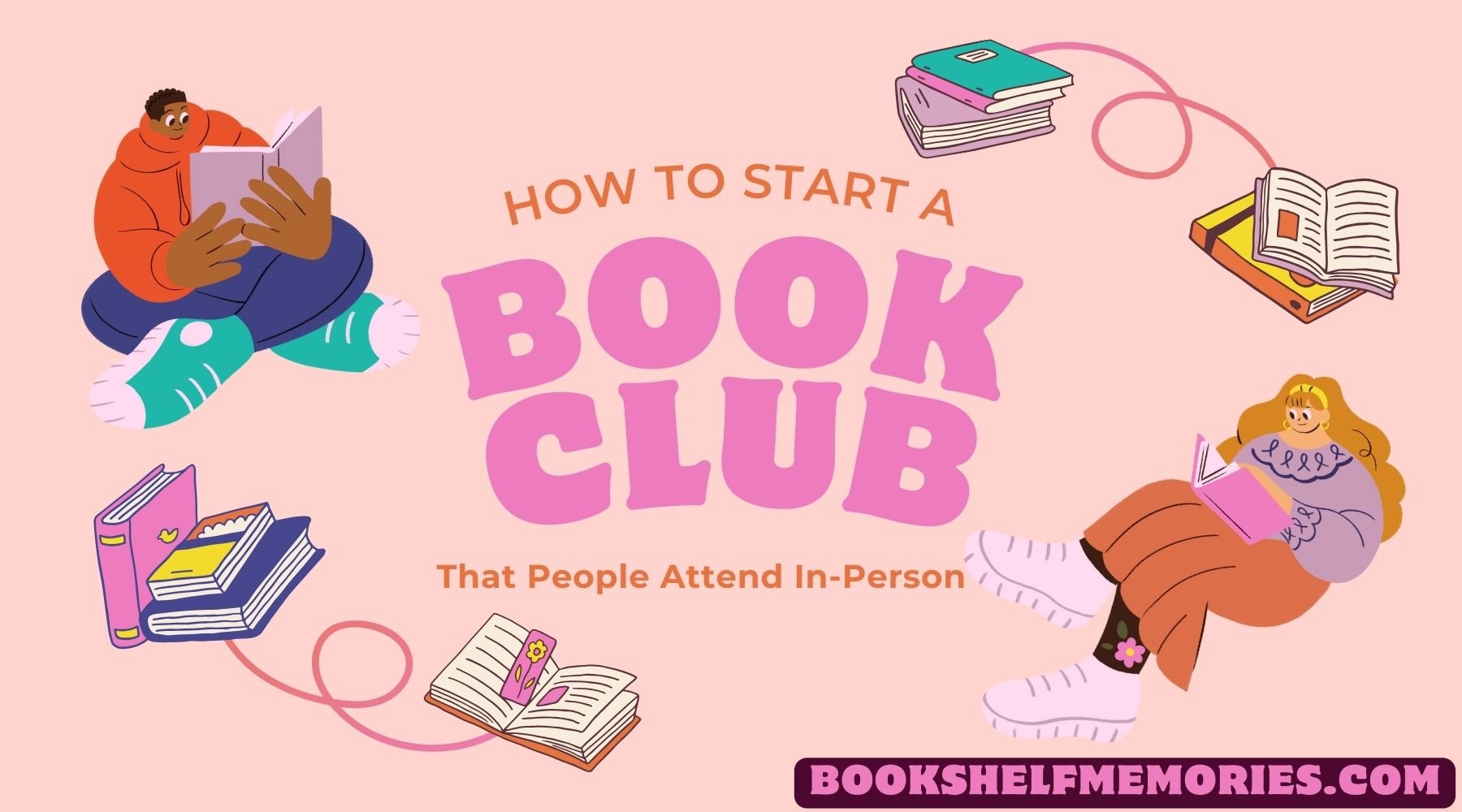The 8 Pivotal Steps to Start a Successful Local Book Club
1. Determine the purpose

Credit: FounderJar.com
Every club has a purpose. An objective to attain. Why do you want to start a book club? For making friends with a shared interest, to discuss new releases, analyze books in a specific genre, or perhaps your club could be exploring religious books about belief, faith, morality, and attaining a deeper spiritual connection with the divine, in which case, the next step is easier because you can invite people from your local place of worship be that a Church, Chapel, Cathedral, Synagogue, Temple or Mosque. That's the beuaty of books. The genres share commonalities.
2. Finding and inviting the right members

The first step of setting your clubs objective helps you put your book club into a genre. That’s going to appeal to readers with a similar interest. For in-person meetups where people come to your home and you to theirs, vetting is important. The simplest way to do that is to ask your friends to invite friends of theirs who they feel would be interested. If you have three good friends working in three different companies, and in a different neighborhood, the extended friends of friends and their colleagues can soon get the word out.
3. Setting the Structure

Giving your book club structure helps meetings run smooth. As the organizer, you’re instantly whisked into the position of the facilitator. (It’s a societal thing). If you create the book club, it’s your group. People will look to you to lead. With a structure in place, you can give the group clear ground rules. Like, “the main thing is to keep the main thing, the main thing”. Stephen Covey, author of Seven Habits of Highly Effective People. Another good ground rule to enforce that is E.L,M.O, which stands for Enough, Let’s Move On. Whenever topics are getting away from the book discussion, any member can say ELMO, and the group respects that and gets back to the discussion that should have been taking place. About the book! The Facilitator School has a list of 18 Ground Rules for Group Discussions.
4. Selecting an appropriate venue

Photo credit: Villageinthecity.net
You can skip this if you’re having the group at your home, or proposing meetups on a rotational basis at members homes who are willing to host. If you don’t want the hassle of hosting, there are venues locally that can be considered for in-person meetups.
Some local libraries and town halls have community meeting rooms. Municipal community centers have private rooms suitable for small to medium sized groups., while larger groups may need a hall. Many local churches, religious institutions and non-profit organizations offer warm space hubs suitable for group meetings. For student groups, university campuses often have meeting rooms, and some local schools have rooms available for community group events too. Not all will be free to use so if you’re planning to use a local venue, inquire about the costs because your book club may need a membership fee to cover the booking fees.
5. Setting the Schedule

For continuity, it’s best to think ahead about people’s schedules. If you know the people likely to be attending have kids that have soccer practice on Saturdays, don’t arrange your first book club meeting to be a Saturday afternoon. In general, people with day jobs and families are busiest on weekdays. Extracurricular activities happen on Saturday mornings, leaving late afternoon and evenings spare for free time to unwind. A book club may just be what they’d appreciate on a Saturday night. Likewise, on Sundays, families may regularly attend church services in the morning, or have brunch with family in the early afternoon, leaving them with time to unwind by late Sunday afternoon into the evenings. Planning the times for people to go to a book club can give them something to look forward at a specific time and day each week.
6. Picking the first book

Yes, you, as the organizer/facilitator should pick the first book. The more decisions people have to make, the less likely they’ll bother. It’s the Paradox of Choice (Barry Schwartz). Streaming services play on this. You open an account, make one decision to watch something - anything - then you’ll most likely be watching what shows up on your suggested watch list. The less decisions you ask people to make, the more likely they'll be to attend. Make the only decision people have to mkae be to attend. Asking for anything more than that could lower attendance rates. Like, starting your first meeting with a book-swap. Then they'd have to decide which book they'd be happy to swap, and think about how people may view them based on the book they bring.
7. Plan talking points

People have expectations. One of those is socializing. When you put a group of people together, there’s a good chance there’ll be extroverts and introverts. As the facilitator, it’s your role to moderate - to make sure everyone has an equal opportunity to participate by not having anyone play the dominant role in the group. Planning your talking points and group activities lets you steer the meeting. And it gives you things to tell people to get them interested in attending again.
To attract bookworms to a book club, have book related activities. Like book speed dating where you tell members to bring their all-time favorite book and give everyone a set time of say, 2-minutes to tell others why it’s their favorite read.
Is it the wordsmithery of the author, the pacing, like how an author controls the experience just with the flow or words on the page? Like, some chapters being slow reads, then in others, the tension picks up, tugging your emotions and you find yourself suddenly reading faster, then it reaches a crescendo before flowing into an all-new plot twist, keeping you reading before heightening the tensions once again a few pages later. It might be witty humor appearing spontaneously, or an authors mastery with dialogue, or characters that are so relatable, you feel like you know them, or the vivid descriptions that illicit clear mental images making it easy to visit this imaginary happy place anytime you flick through the pages.
For something that gives your mind an easy way to wonder into a fantasy world, giving you an instant happy place to soothe your mind, check out our Tokyo Alley Book Nook Kit. A therapeutic craft activity, making a lasting decor piece to adorn your bookshelf, and whisk your mind to another place each time you set eyes on your masterpiece. Displayed in the room hosting a book club, it'll be an instant icebreaker getting people talking.
Other icebreaker activities to lead with are to ask each person to share their earliest or favorite book memory, to ask what book character they’d most like to meet and why, or to ask if they were to take a reading vacation in a remote area with nothing to do but read, what 3 books would they take? That’ll let you know what genres each member likes. If you’re expecting a larger group, or want to be as prepared as possible, a game of Book Title Pictionary could be played with clues written on paper. Split members into teams and each gets up to 7 clues. The team to correctly guess the book title with the shortest clues, wins.
8. Wrap it up with a group discussion on book selections

Group participation is vital for members to feel included. Going forward, have a process that’s decided by your peers. Until your book club becomes established, it’s likely be a small number of people. Each may be interested in different genres. That can be addressed by rotating the book selection weekly, giving members a sort of mystery read for each week or month, introducing them to genres they may never have explored.
The more literary genres people ‘actively’ read, and discuss, helps with self-growth. Their own assumptions can be challenged, they can improve their active listening skills, and experience personal growth way better than reading in silence alone and rarely discussing what they read, or sharing their thoughts with anyone. Overall, the opportunity for personal self-growth is enhanced through a book club. You can be the person to help people improve people’s literary experiencing by starting the book club they never knew they needed!




Share:
Best Puzzle Gifts and Skill Toys for Teens that Don't Need Tech
The Top 10 Japanese Dishes and Where to Find Them